
I spent a lot of time listening to radio (thanks, jacapps, for making it easy) yesterday – the day after the President’s much-ballyhooed State of the Union Address.
Of course, it was “the topic” on talk stations and public radio outlets. After all, that’s what they do.
On music stations, the SOTU speech didn’t happen. Morning shows on music stations found any number of secondary topics to talk about, along with standard benchmarks like “War of the Roses” or “Moron of the Day.”
It’s been this way for a LOOONG time now. As the commercial broadcast industry became a bigger and bigger business, most music stations have steered clear of controversy for fear of antagonizing advertisers and facing blowback from a divided audience.
But it’s all around us now – on NFL football fields, on cable news day in and day out, and at dinner tables all over America. These days, seemingly everyone has an opinion. Except music radio stations.
When we think about the seminal era of protest movements, most of us flash back to the most activist period of the past 50 years – anti-war rallies, civil rights protests and sit-ins that dotted the Sixties. Baby Boomers were in the vanguard of these moments, making their feelings known on the streets, in Washington, D.C., as well as at events like the Democratic Convention in 1968.
But what does that look like today? Do Boomers still have the monopoly on that protest gene, or has the torch been passed to Millennials and their younger brothers and sisters – Gen Z? How are younger generations of Americans redefining what it means to speak out and be heard?
And what – if anything – does this have to do with brands? Politics has become a taboo topic at most family gatherings, business meetings, bowling leagues, and kids’ soccer games. For all those reasons, most stations and their most popular personalities avoid the conversation rather than instigating it.
Yet, causes and societal issues are very much in the center ring of media and entertainment, whether it’s cable news, late night TV shows, and of course, social media and the Internet. Everything is political. More and more, brands are taking stands and making statements about the state of the country.
I was reminded of this by a couple of commentators to our Super Bowl ads post earlier this week. Some believe that political correctness has sanitized agency copywriters, causing marketers to go blander and safer.
Perhaps, but whether Howard Schultz ends up being a viable presidential candidate or not is overshadowed by the fact that Starbucks’ activism has been the engine that has vaulted him into the public eye.
Nike’s Colin Kaepernick campaign, followed by Gillette’s recent foray into gender politics, suggests that some marketers see value in taking stands – even if they are at the pinnacle of controversy. Perhaps that’s because Millennials – in particular – seem to favor companies that do more than just sell stuff.
And to that point, by a wide margin, Millennials applaud Nike’s gamble to feature Kaepernick – and they ended up becoming even greater consumers of Nike products. As for older generations, Nike’s marketing plan was met with indifference or derision.
Opinionated brands that speak out are appreciated by Millennials. That’s backed up by a survey from RetailMeNot, showing that two-thirds of 18+ Internet users agree brands should take public stands on key social values.
The eMarketer chart below and the analysis of Lucy Koch suggest majorities of young people would be more likely to recommend these brands to friends and purchase more of their goods.
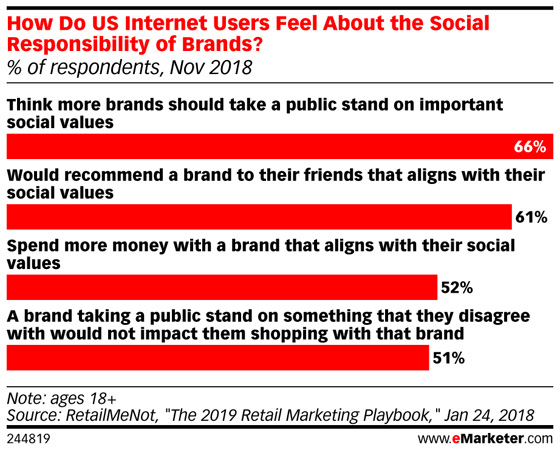
So, Millennials put their money where their hearts are. But what about boycotting products?
Another study – this one from CompareCards.com – says one-third of Millennials (and Gen Xers) stopped during business with a company they had once spent money with. A story in Retail Dive by Corinne Ruff notes that companies like REI and Patagonia have benefited from their positions on the environment – aligned with the sensibilities of their customers.
The generational chart from this study clearly shows a greater propensity – especially among today’s younger Millennials – to boycott goods or services the disagree with. Note that Boomers – once the activist protesters – look rather tepid in their vitriol today:
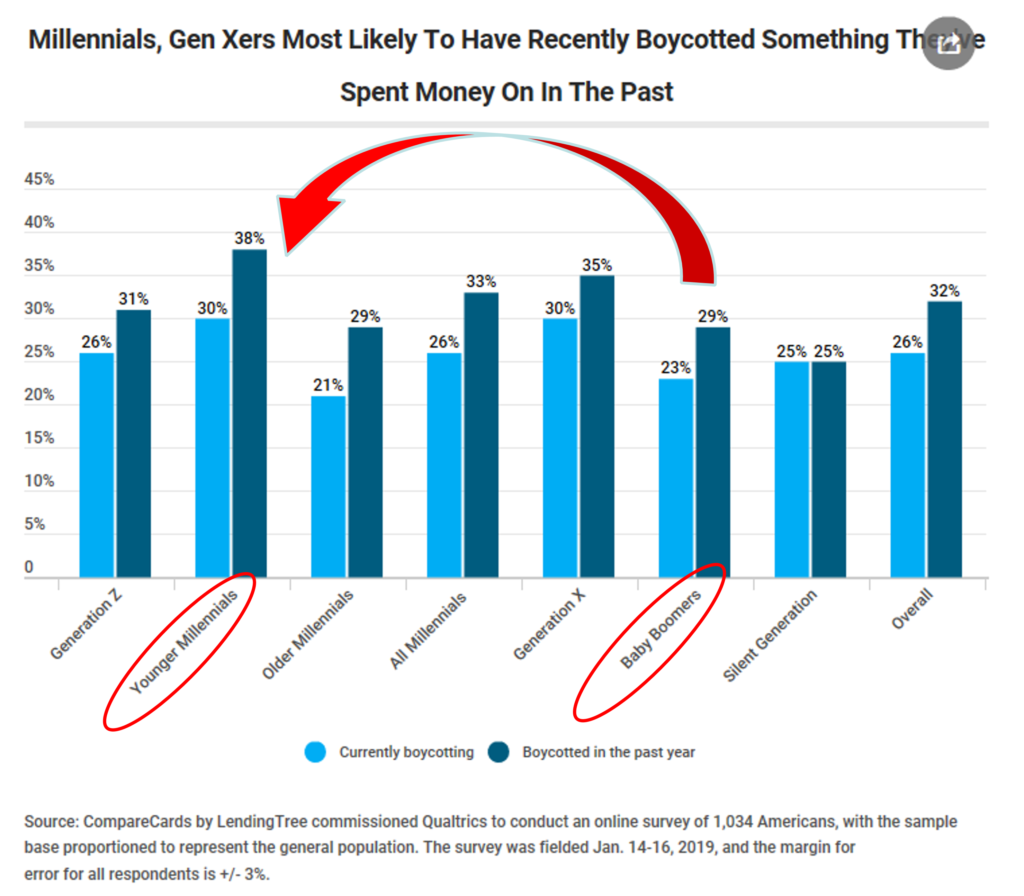
But for radio, this kind of activity – a radio brand advocating for a cause – just isn’t done. Many broadcast executives would tell you there’s simply too much at stake.
In the early days of FM radio when stations had a lot less value than they do today, taking a stand for causes like the Vietnam War were considerably more common. Protests were part of the fabric of many popular rock songs – “Ohio,” “For What It’s Worth,” and even Edwin Starr’s “War” all were sung out of the same hymnal.
In the early years, even Bob Seger sang about social issues in songs like “Persecution Smith” and “2+2=?.” Creedence Clearwater’s Revival’s 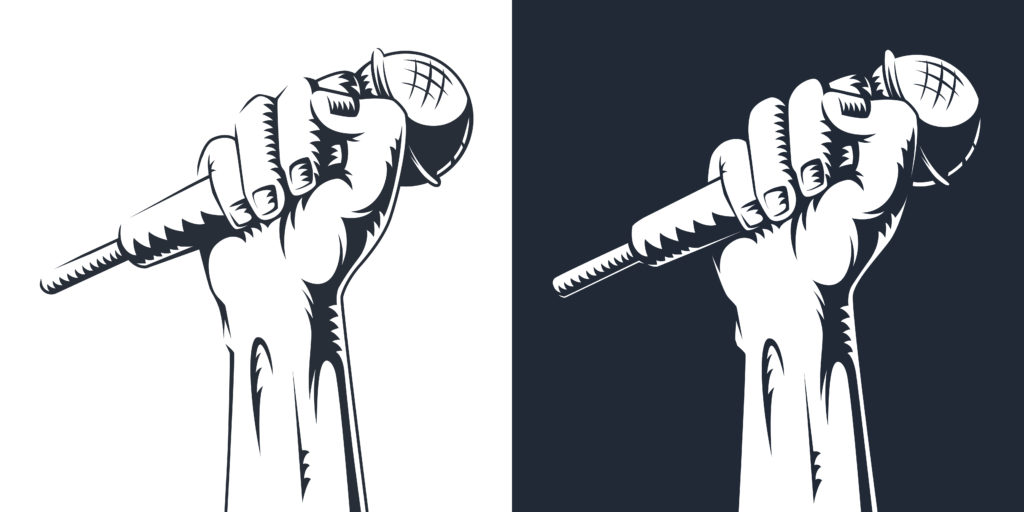 “Fortunate Son” was a song about privilege and class. And Motown got the message from Marvin Gaye’s “What’s Goin’ On” and the Temptations’ “Ball of Confusion.”
“Fortunate Son” was a song about privilege and class. And Motown got the message from Marvin Gaye’s “What’s Goin’ On” and the Temptations’ “Ball of Confusion.”
And the DJs of the day often reflected much of those same values and social concerns.
Believe it or not, one of the most famous examples of a radio station and a popular personality taking a stand didn’t occur back in 1968. It was two decades later in 1988.
Charles Laquidara was the host of WBCN’s “Big Mattress” morning show, and an outspoken, out-sized personality on Boston radio. Charles organized a campaign against apartheid on his morning show that railed against Shell Oil and its business dealings in South Africa. Creating a campaign called Shellshock, he took to the airwaves to encourage BCN listeners to cut their Shell credit cards in half and mail them in with the goal of encouraging the oil company to stop doing business there.
This became a cause de célèbre for Laquidara and BCN, garnering a lot of mass media coverage, including a New York Times feature – “A Disc Jockey Challenges An Oil Company.”
In the story, Charles explains that BCN’s owner – Infinity Broadcasting – tolerated his protest campaign, but did not endorse it. Run by the iconic Mel Karmazin, the company had a reputation for supporting controversial talent like Laquidara and Howard Stern.
The archived story news story below that ran on WGBH-TV is a true trip back in time. And if you’re wondering whether the campaign caught fire, watch the video and take note that Red Sox superstar Roger Clemons signed on to Charles’ campaign, as did Boston Mayor Ray Flynn. It is impossible to imagine something like it happening on broadcast radio today.
Back in Laquidara’s era, a campaign like Shellshock cemented loyalty with his audience. In subsequent focus groups I’ve conducted in the market over the ensuing years, I’ve heard listeners reminisce about this radio protest, and the days when radio DJs took a stand.
And that’s why these stories in eMarketer and Retail Dive about Millennials respecting companies that advocate for a cause resonated with me. It is very much a throwback to a different time in America when young people appreciated and gravitated toward those who expressed their opinions.
Amazingly, the CompareCards study asked more than 1,000 Americans last month whether they’d be up for a credit card boycot – similar to what Laquidara pulled off 30 years ago:
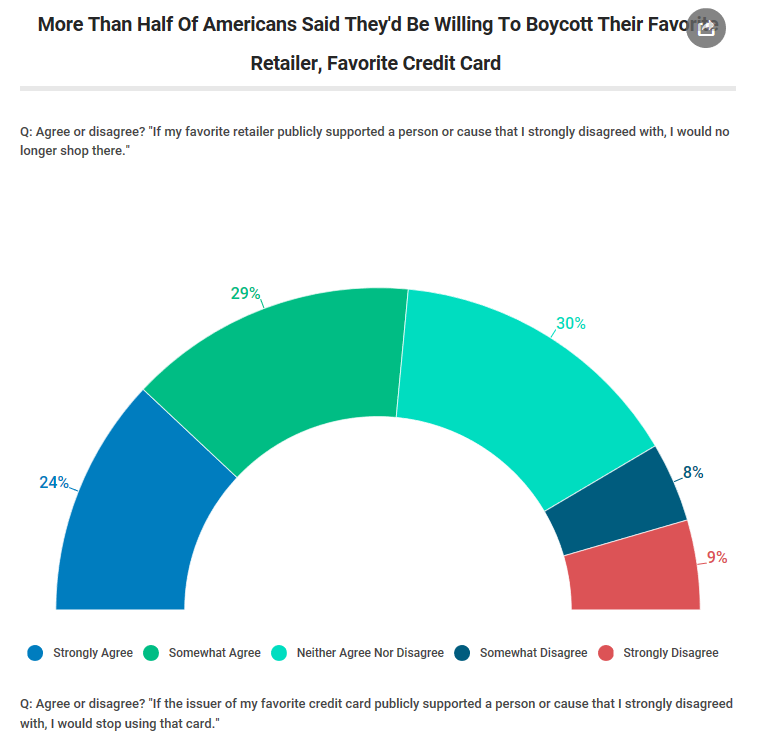
The fact that a majority agrees (or agrees strongly) they’d cease use of a favorite credit card if that company supported a cause that ran against their political/moral grain. Looks like Charles might have been onto something.
Do not interpret this post as encouragement for morning radio DJs to “Be like Charles” and adopt a cause. That’s not its point.
Local radio has the ability like no other medium to connect with its audience, reflecting their feelings and values, while making it entertaining. Could these kinds of campaigns ever happen again, igniting interest among today’s Millennials? That’s up for debate, of course.
But CompareCards’ chief industry analyst, Matt Schultz, boiled it down this way:
“Americans simply want to be heard.”
And when it comes to today’s Millennials – a generation that hasn’t had it so easy and has often been derided and misunderstood – maybe that’s what
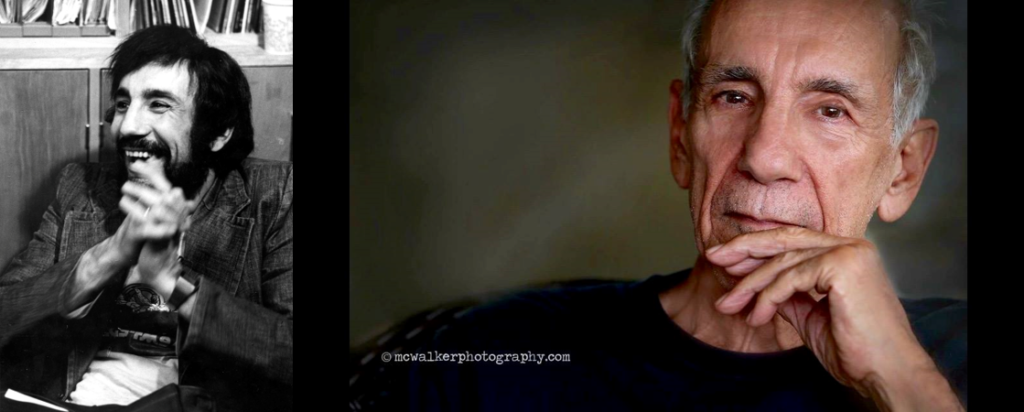
this is about. They feel alienated and ignored – not dissimilar to how Boomers were feeling back in 1968.
Ironically, the racial injustice Charles Laquidara was railing against in Boston 30 years ago is as big an issue in our politics and in our discourse today. Charles’ controversial stance and ensuing campaign may seem like it came from a morning guy from another dimension would do – the idea of this happening today is unthinkable – despite the fact there’s a generation – or two – waitiing to hear it.
It makes you wonder whether a timely, heartfelt, authentic message in 2019 that emanates from a radio station or a popular personality – whether in a car, from a smartphone, or on Alexa – could motivate young people to once again ask the question:
“Children, what’s that sound?”
And in the process, make morning radio relevant again.
For more on Charles, click here.
- Like A Pair Of Old Jeans - April 2, 2025
- What’s Fair Is Fair - April 1, 2025
- What’s On Your Bucket List? - March 31, 2025




We learn from history; it repeats. 1968: FM radio was new, exciting and unpredictable. Album cuts replaced singles. Announcers said something. It was time to Stand Up, Stand Out, Be Real, Expand The Brand, Take Responsibility and Present Solid Personality. It was all about Enthusiasm; just don’t say the 7 Dirty Words. We could give away a “kilo” but were careful about playing Dylan’s Hurricane. These daze, CYA, 30 year PC flashbacks and overly safe line items demand “Don’t Rock the Boat.” But our ocean’s full of waves and Millennials are the direct descendants of the Boomers. Time to Reembrace Profitable & Strategic Self Expression. Radio 100: Great Wave Connection.
Clark, thanks for framing this up.
I have to respond because I am part of a morning show on a country station and we have made the conscious & very deliberate decision to NEVER talk politics. Let me tell you why. It has nothing to do with scaring off advertisers or even bosses telling us to steer clear. We know politics is very polarizing and in this day and age, politics in media is everywhere. It’s different now in radio than it used to be. There are many talk shows that are political… it’s all they do. Rush, Hannity, ets… heck, you can also listen to Fox News or CNN or other networks on satellite radio if you wish. Any listener who wishes to hear about politics can easily find that. We are NOT a political show… we are a fun, music intensive morning show and we want to be an escape from that. Why talk about it? Why argue, why go there? Does it put anyone in a good mood? We want to put you in a good mood… most people are driving to a job they may not necessarily like, making less money they think they deserve, possibly working for a boss they don’t like. What can we do to put you in a better place before you get there? Let’s laugh, let’s have fun… let us be your escape from your problems, worries, whatever craziness is stressing you out. If politics is what you want, you can get that in numerous places, from people more qualified to talk about it than us. In fact, if we start talking politics, we’ll just argue, because we all have different viewpoints and who wants to hear that in the morning? So, we are an escape from all that craziness… we WANT to be an escape. That is why we have made the decision to not talk politics in the morning. We have a clear idea of what our morning show is and being a fun escape from the worries in your life for just a little while is what we strive to be. Politics does not fit what our show is or wants to be.
Toni, I couldn’t agree more. And I’m remiss by not mentioning how many shows fill precisely the need – for escape, laughs, mood elevation, and all the things you mention here. But those characteristics pretty much describe EVERY music radio morning show, whether it’s Elvis Duran or a morning team in Anchorage. And while the best of the best perform a great service by keeping it light, fun, and non-controversial, isn’t there room for a morning show in the market with talent, skill, and deftness to be able to talk about the world around us – without it descending into a s*** show?
I give you and your team credit for identifying your lane and staying in it. Hundreds of shows around the country are doing just that and making it work. But there’s life beyond “Second Date Update” for personalities that truly want to engage with audiences on issues more serious than husbands who don’t put down the toilet seat.
Love to hear back from you and others. Thanks for engaging with me on a topic more interesting than “setting occasions” or stopset placement.
Could not have summed up my thoughts more perfectly, Toni! Thank you. There are endless choices for politics and controversy. Let’s hope there are also always choices for those looking for a nice, fun, commute free of the stresses of politics and division.
Our sports talk morning show is more about reporting than opinion. The P1s have told us they appreciate being able to form their own opinions, not have ours forced upon them. This makes the show more about the listener’s favorite team, not our opinions. I was an FM morning host in the in the 1970s. Activism was a small part of our brand. The real focus was on the emerging empowerment of a generation. Our major promotions were mega events – raft races, car rallies, concerts, etc. Nixon, Vietnam, social issues were way secondary. We were rebels, but in a positive way. That’s is why the station emerged as a dominant player even with a mere 35 percent in car FM penetration.
Bob, thanks for those observations. Connecting with the audience’s lifestyle – beyond music – is an important way of engaging.
Fred,
Your thoughtful, thought-provoking, honest observations on the current state of the radio industry and its future nearly always start really important conversations. This post is no exception.
You’ve veered into two fundamental questions for radio personalities and radio stations the answers to which will determine their success or lack of it now and in the future:
What should a radio personality talk about in order to attract the largest and most loyal audience they can?
Why does nearly “EVERY” music radio morning show sound the same and present essentially the same stuff?
I could write a book about these questions and I suspect you could, too. There’s not room for a book here in your comments section, so I’ll just share three blog posts I’ve written over the years that attempt to answer these questions:
“How to attract the largest, most loyal audience you can.” https://tinyurl.com/yakg4kxy
“Fatal temptation for radio personalities.” https://tinyurl.com/y7xl4nrf
“Do you have to change your life?” https://tinyurl.com/yb6hrfvm
Thanks for starting another very important conversation.
Bill, I appreciate the kind comments. I knew when I wrote the post that it would ruffle some feathers, and even make some people uncomfortable. That’s OK.
I also knew I would get some pushback – also not a bad thing.
My posts should be scrutinized and challenged. Hopefully, they stimulate conversations, and help organizations make some of the tough calls that every media brand is facing. Thanks for sending along the “homework,” Bill, and also for adding to the conversation.
Fred,
Your thoughtful, thought-provoking, honest observations on the current state of the radio industry and its future nearly always start really important conversations. This post is no exception.
You’ve veered into two fundamental questions for radio personalities and radio stations the answers to which will determine their success or lack of it in the future:
What should a radio personality talk about in order to attract the largest and most loyal audience they can?
Why does nearly “EVERY” music radio morning show sound the same and present essentially the same stuff?
I could write a book about these questions and I suspect you could, too. There’s not room for a book here in your comments section, so I’ll just share three blog posts I’ve written over the years that attempt to answer these questions:
“How to attract the largest, most loyal audience you can.” https://tinyurl.com/yakg4kxy
“Fatal temptation for radio personalities.” https://tinyurl.com/y7xl4nrf
“Do you have to change your life?” https://tinyurl.com/yb6hrfvm
Thanks for starting another very important and valuable conversation.
Great post but I’m not sure it doesn’t make the case for both sides of the same argument.
Consider the headline over the CompareCards study: “More than half of Americans said they’d be wiling to boycott their favorite retailer/favorite credit card.”
I don’t mind listening to politics or controversy if that’s what I’m looking for, but I can think of two morning shows and two TV hosts that I just got tired of them going off on politics. I didn’t “boycott” these programs, per se, I just found myself less interested–and eventually stopped watching/listening–to them all.
There’s certainly room for both–morning shows that know their audience and can engage in these topics successfully, while others purposely steer clear–and then letting the listeners decide.
But do we really want to read a headline one day saying, “”More than half of Americans said they’d be wiling to boycott their favorite retailer/favorite credit card/radio station”?
Dave, it totally makes the case for both sides. When every morning show is avoiding something as big as the State of the Union speech or even the racist eruption in Virginia, what does that say about music stations and their role. Should every one be about escape? Or is there rooom for a balance IF (and big IF) there’s talent with the skill, finesse, and mindefulness to pull it off.
Talking about the world around us doesn’t have to devolve into a frustrating shouting match between unreasonable on both sides of the issue. Charles Laquidara was speaking out about apartheid in South Africa. What’s the “other side” of that argument.
I appreciate the comments and your ponit of view, Dave. Thanks for reading and conntributing.
Exactly and very well said. There’s room for both, but right now it’s mostly the sound of crickets rather than take a chance of saying anything provocative or controversial. By the way, did you catch the price for a gallon of gasoline in that news story?? 98 cents?? Filler up DING DING!!